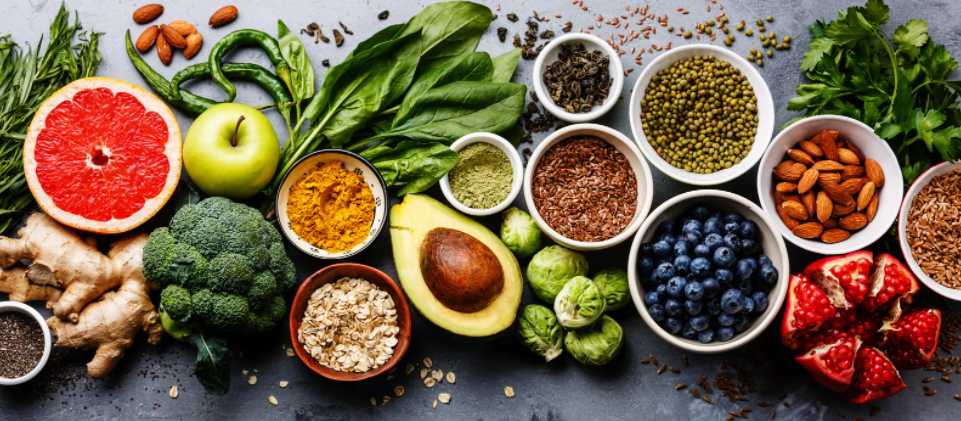Ever since Covid-19 came into – and altered – our lives in early 2020, people have been searching for ways to give their immune systems a boost in the hopes of lowering their chances of contracting the virus. Now that winter is coming around for a second time since the beginning of the pandemic, it is more crucial than ever for us to be proactive in taking care of our health and wellbeing.
Rather than providing a temporary ‘boost’ to our immune system, Harvard studies recommend making small and sustainable lifestyle changes to ensure that the body can function at its best.
Read on for some tips on how to look after and improve your immune system.

Tip #1: Add Immune-Boosting Foods to a Varied Diet
Having a diverse and nutritious diet is well-documented as being crucial for our health. Not only does a varied eating plan help with weight management, brain function, and general wellbeing, but it can also contribute to how well our immune system protects us. Research has shown that certain foods such as berries, garlic, yoghurt, fermented foods, and oats can all contribute to a healthy immune system. Try having a bowl of oatmeal for breakfast or some berries with yoghurt as a snack as an easy way to incorporate these health-boosting foods into your diet.
Tip #2: Improve your Sleep Hygiene
Studies have shown sleep to be extremely influential in all aspects, but particularly in fighting off disease and illness. In sleep studies, less sleep is linked with a lower rate of fighting off infection, so it is vital we practice good sleep hygiene practices. Getting a minimum of 7 hours is vital for minimizing the chance of strokes, cardiovascular disease, and mental health issues, among a myriad of other illnesses. However, it also ensures that certain chemicals that aid immunity are replenished while our body rests. For the best sleep, ensure your room is dark and quiet, with clean, comfortable bedding, and minimal distractions from screens and outside stimulation.
Tip #3: Reduce Alcohol and Tobacco Intake
Smoking is detrimental to our health for a myriad of reasons, but one lesser-known side effect of being a regular smoker is a decline in your body’s ability to fight off disease and sickness. As Covid 19 is a respiratory disease, it is more important than ever to take care of our lungs, so maybe add ‘quit smoking’ to your list of New Year’s Resolutions this year! Similarly, alcohol dehydrates the body and distributes communication between the gut and the rest of the immune system, so try and minimize your intake of alcohol if you want to improve your immune health as much as possible.

Tip #4: Manage Stress Levels
Perhaps a surprising element of immune system maintenance is ensuring our stress levels are manageable and don’t reach a damaging level. Of course, many stresses in our daily lives are unavoidable, but there are steps we can take to ensure these stresses don’t begin to affect our health and wellbeing. Take the time to learn what heightens and lowers your stress levels and make lifestyle changes based on your observations, where possible.
Tip #5: Practice Good Personal Hygiene
While our bodies have a built-in system designed to fight off any infection that does enter our bodies, it is still important to maintain proper hygiene to ensure we aren’t increasing our risk of infection unnecessarily. Following government guidelines on masks, handwashing, and avoiding transmission of bacteria and disease among others is vital in ensuring that the spread of the virus is minimized as much as possible.
Tip #6. Get Moving!
Exercise, as well as improving our general health and wellbeing, improves circulation and cardiovascular health, both of which are vital in fighting off disease and illness. Regular exercise is good for us in so many ways, so making sure our bodies our moving in a sustainable and enjoyable way is a valuable addition to our daily routine. Walking around the local park or picking up some free weights at home while watching a favourite TV show is a great way of getting our blood pumping and is also a great source of dopamine.
- Discuss your exercise plan with your doctor before implementing any large changes, as some exercises, when done incorrectly, may do more harm than good.

Tip #7: Get Outside!
As stated in the previous tip, movement is an important element of our health where possible but try and make sure some of that exercise is happening outside when your lifestyle allows. Getting outdoors several times a week contributes to improved mental health and physical wellbeing, as well as being a good method for getting some vitamin D.
Tip #8: Stay Hydrated
Ensuring that our body stays hydrated is crucial in all aspects of our health and wellbeing and makes sure all our bodily functions are working well. While tea and coffee may count towards our recommended 8 glasses a day, it is best to stick to water where possible, as it ensures maximum hydration without the added sugar or caffeine.
Tip #9: Take Vitamins and Supplements
Now that the nights are getting longer and the days are getting colder and darker, it has become more difficult to get the recommended daily vitamin intake, so don’t be afraid to incorporate supplements and vitamins into your diet during the winter. Vitamin C, D, and Omega 3 are particularly important and so when the natural sources are harder to come by it is fine to turn to store-bought in its place.

These are just a few ways in which we can take care of our bodies now that our health is more important than ever. Ensuring our mental and physical health are prioritized is crucial within a pandemic, so incorporate some of these changes into your daily routine where possible – and with approval from your doctor – to maintain your immune system and protect yourself as best as possible from the risk of Covid-19.
By Abigail Whitney
Likambi Global Publishing

